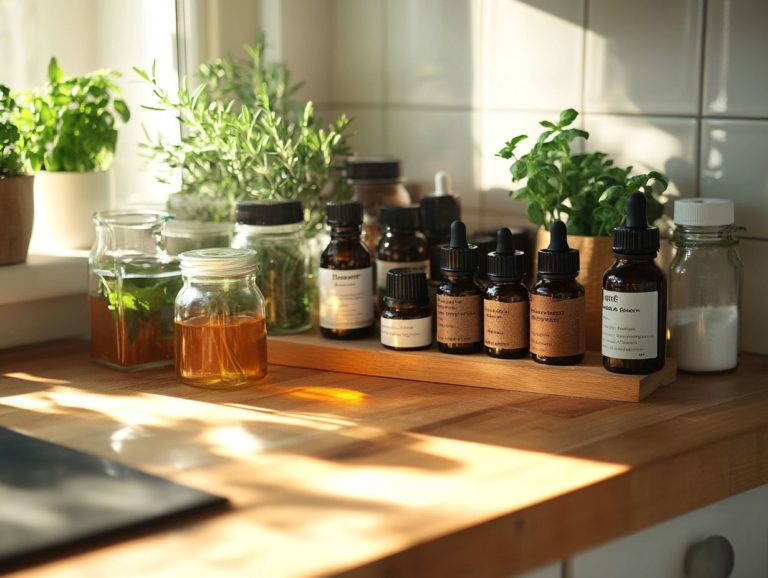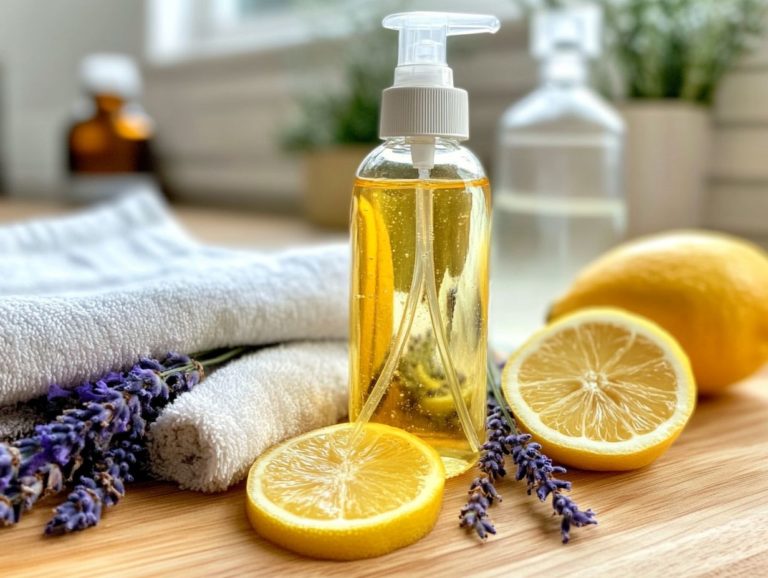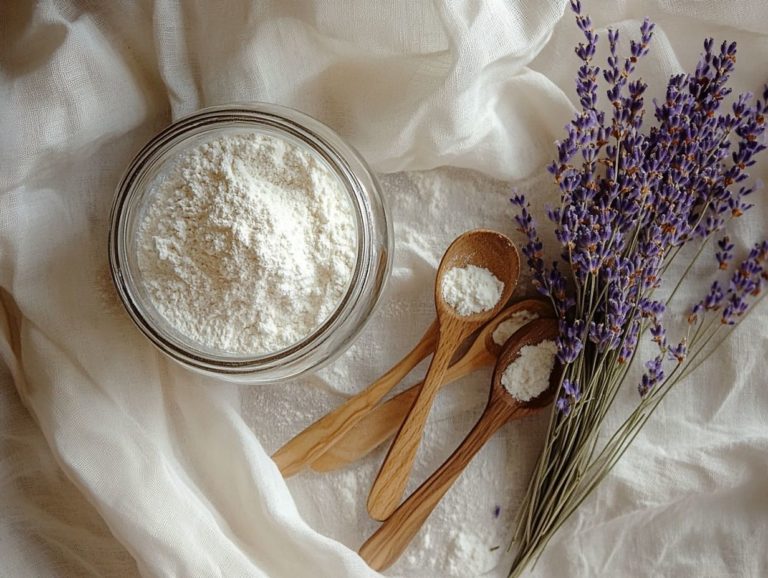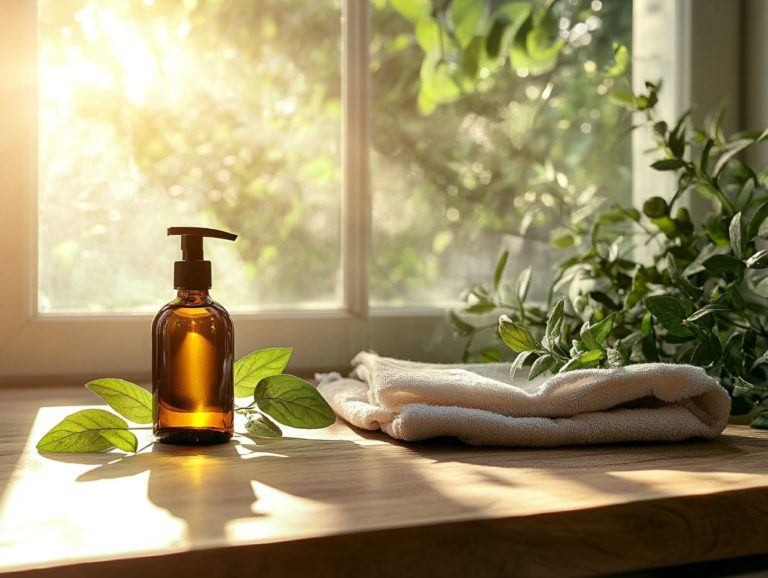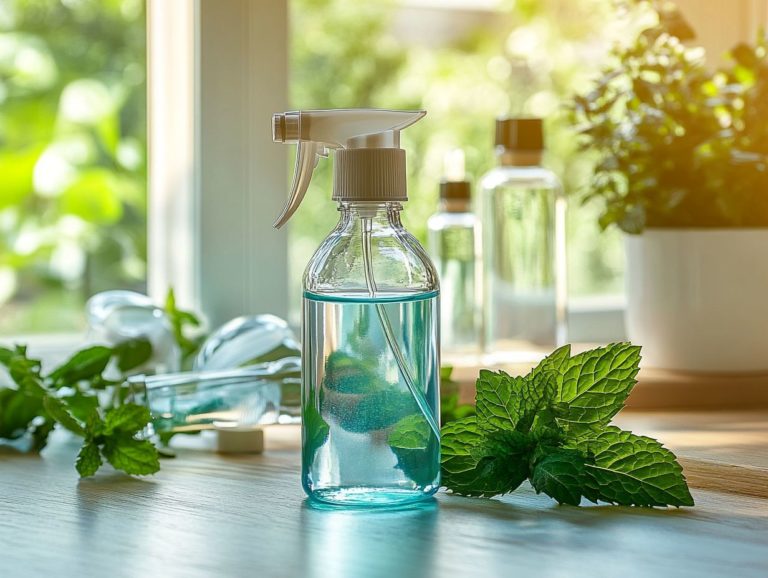How to Use Essential Oils for Pet Odor Removal
Pet ownership is a delightful experience, but it can also introduce some odor challenges. Thankfully, essential oils provide a natural and effective way to banish those pesky smells from your home, serving as excellent pet stain removers.
This article delves into the world of essential oils, explaining how they work to combat pet odors and highlighting some of the best options available, such as tea tree oil, bergamot oil, and rosemary oil. You ll also find practical tips on how to apply them and essential safety precautions to ensure your furry companions remain safe while you refresh your living space.
Prepare to say goodbye to unwanted scents and embrace a fresher home!
Contents
- Key Takeaways:
- What Are Essential Oils?
- How Do Essential Oils Work for Pet Odor Removal?
- What Are the Best Essential Oils for Pet Odor Removal?
- How to Use Essential Oils for Pet Odor Removal?
- Are Essential Oils Safe for Pets?
- Other Natural Methods for Pet Odor Removal
- Frequently Asked Questions
- What are essential oils and how can they help with pet odor removal?
- What are the best essential oils to use for pet odor removal?
- How do I use essential oils to remove pet odors?
- Are essential oils safe to use around pets?
- Can essential oils be harmful to pets?
- Can I use essential oils for pet odor removal on all surfaces?
Key Takeaways:
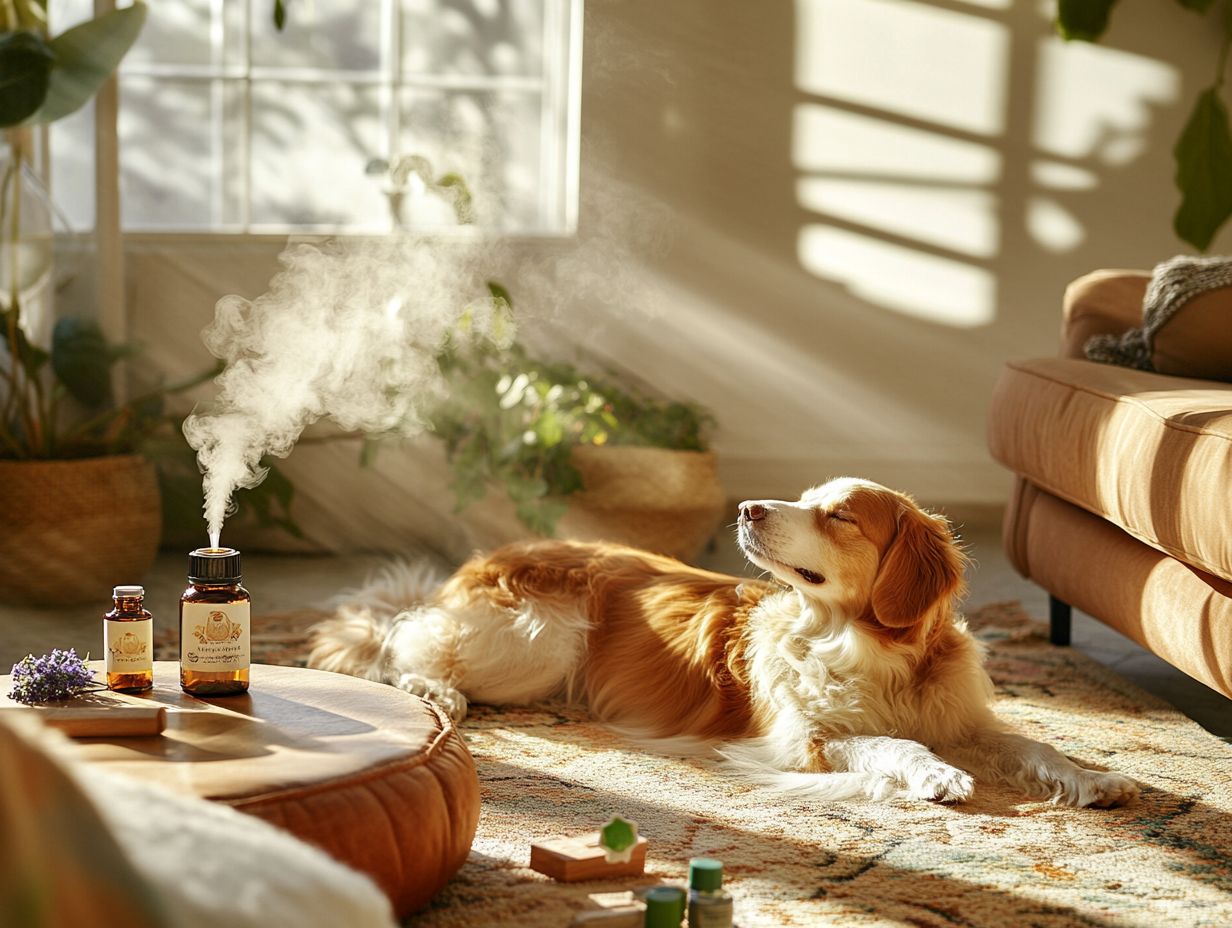
- Use essential oils like lavender, lemon, eucalyptus, peppermint, and cedarwood for natural pet odor removal.
- Dilute essential oils and use them in a spray bottle, diffuser, or cleaning solution to effectively eliminate pet odors. Consider using apple cider vinegar in your cleaning solutions for better odor elimination.
- Take precautions when using essential oils around pets, and consider other natural methods like baking soda, vinegar, activated charcoal, and hydrogen peroxide.
What Are Essential Oils?
Essential oils are concentrated plant extracts that encapsulate the natural fragrances and beneficial properties of diverse flora. Renowned for their therapeutic qualities, these oils find their place in aromatherapy, cleaning, wellness practices, and even air quality testing.
Oils like tea tree, lavender, lemon, peppermint, eucalyptus, and cedarwood are not just cherished for their delightful scents; they also boast impressive antibacterial and antifungal properties. This makes them invaluable allies in crafting an inviting atmosphere while effectively banishing unwanted pet odors.
How Do Essential Oils Work for Pet Odor Removal?
Essential oils serve as an excellent remedy for pet odor removal, utilizing their natural compounds to effectively neutralize and eliminate those unpleasant smells pets tend to leave behind. This natural solution is far superior to chemical-based air fresheners, which only mask the odors temporarily.
Unlike chemical-based air fresheners that merely mask odors for a fleeting moment, essential oils offer a more enduring solution by addressing the root cause of the scent. Oils like lavender, tea tree, bergamot, and lemon not only eliminate odors but also enhance the overall ambiance of your space, promoting better air quality and wellness throughout your home.
What Makes Essential Oils Effective for Pet Odor Removal?
The effectiveness of essential oils in eliminating pet odors lies in their unique chemical compositions, which feature antibacterial and antifungal properties. These qualities help neutralize not only the odors themselves but also their underlying causes, such as bacteria and mold. Essential oils like tea tree oil, eucalyptus oil, and rosemary oil exemplify these benefits, making them ideal natural solutions for you as a pet owner aiming to maintain a clean and pleasant living space.
Research supports the notion that these essential oils can reduce harmful microbial growth, a significant contributor to persistent smells. For instance, a study published in the Journal of Essential Oil Research highlighted that certain essential oils could significantly inhibit bacteria commonly found in pet areas.
Additionally, anecdotal evidence from fellow pet owners suggests that combining these oils with other natural solutions like vinegar and baking soda can enhance their effectiveness. Vinegar works to neutralize odors, while baking soda absorbs them; together with essential oils, they provide a comprehensive approach to pet odor management. You can even consider consulting companies like Inch By Inch Inspections Inc. for thorough air quality testing to ensure your home remains fresh and healthy.
This multi-faceted strategy not only addresses immediate smells but also fosters a healthier environment for both you and your furry companions.
What Are the Best Essential Oils for Pet Odor Removal?
In the realm of pet odor removal, a select group of essential oils emerges, renowned for their remarkable ability to neutralize unpleasant smells while infusing your home with a delightful fragrance.
Lavender oil is a standout choice that not only calms the atmosphere but also combats odors. Its soothing scent and bacteria-fighting qualities make it an excellent option for pet owners.
Lemon oil brings a vibrant, fresh aroma that effectively cuts through stubborn pet scents. Unleash the power of lemon oil for a refreshing boost in your home!
Eucalyptus and peppermint oils further enhance your arsenal against odors, making them favored selections for crafting tailored mixtures of essential oils that every pet owner will appreciate.
1. Lavender Essential Oil
Lavender essential oil is celebrated not just for its enchanting fragrance but also for its impressive bacteria-fighting qualities. This adaptable oil has the ability to soothe both pets and their owners, fostering a calm and cozy home.
The calming scent of lavender eases anxiety and promotes relaxation, benefiting both your furry friends and yourself. When paired with its natural odor-eliminating qualities, it becomes an ideal addition to any pet-friendly home.
If you’re keen on maintaining a fresh-smelling space, consider blending lavender oil into your DIY spray recipes. This versatile concoction can be applied to upholstery, carpets, and even bedding. Just remember to dilute it appropriately and keep an eye on your pets’ reactions, as some may be sensitive to essential oils.
Always keep your pets’ safety in mind when using essential oils, and consult your veterinarian for the best practices.
2. Lemon Essential Oil
Lemon essential oil is highly regarded for its bright and invigorating scent, which eliminates unwanted odors and serves as a powerful bacteria-fighting agent. This delightful oil can elevate your mood while refreshing the air, making it a preferred choice for pet owners.
Its robust antibacterial properties ensure that unpleasant odors are neutralized rather than merely masked, resulting in a cleaner and more inviting living space.
To safely incorporate lemon oil around your pets, always remember to dilute it in a carrier oil or water before use, and refrain from applying it directly onto their skin.
You can effortlessly add it to a homemade cleaning solution or a diffuser, turning it into a natural air freshener that promotes a fresh and welcoming environment. Just keep an eye on your pets around the diffuser, and ensure there s plenty of ventilation for their comfort. For those persistent odors, consider using a pet stain remover to address specific areas.
Try out these tips today for a fresher home!
3. Eucalyptus Essential Oil
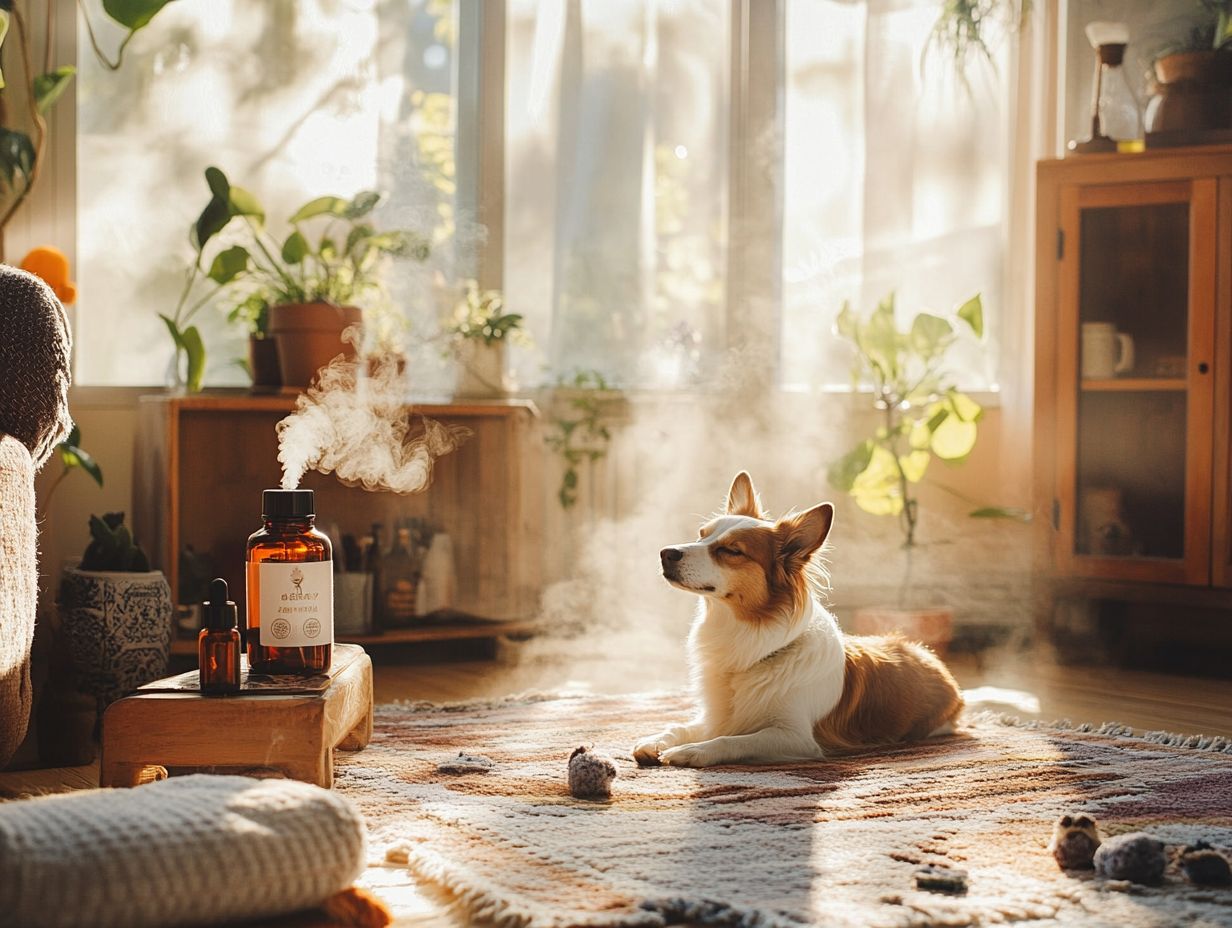
Eucalyptus essential oil stands out for its fresh, invigorating scent, revitalizing your living space while effectively eliminating stubborn pet odors. With its antiseptic qualities, this remarkable oil becomes an invaluable ally for anyone striving to maintain a clean and healthy home for their furry companions.
Combine eucalyptus with other essential oils like lavender or lemon to craft a refreshing blend that enhances its odor-fighting prowess while cultivating a soothing ambiance.
Exercise caution to ensure that any mixture is safe for your pets. While diffusing eucalyptus oil can create a delightful atmosphere, keep the space well-ventilated and allow your pets access to areas where they feel most comfortable.
By thoughtfully incorporating eucalyptus oil into your home, you can enjoy a cleaner environment without compromising the well-being of your beloved animals.
4. Peppermint Essential Oil
Peppermint essential oil is celebrated for its sharp, refreshing fragrance, which not only creates a pleasant atmosphere but also effectively neutralizes pet odors. Its invigorating scent is both delightful and functional, working to combat unwanted smells in your home.
This powerful oil boasts antimicrobial properties that enhance its deodorizing capabilities, making it an excellent choice for households with furry companions. When you blend peppermint with other essential oils like lavender or lemon, you can amplify the effects, providing a more comprehensive approach to odor control.
However, exercise caution, as some oils can be harmful to pets. It s vital to keep diluted blends in areas that are out of reach for your animals, ensuring their safety while still reaping the rewards of peppermint oil and its aromatic partners. Always follow safety tips to avoid any adverse effects.
How to Use Essential Oils for Pet Odor Removal?
You can effectively tackle pet odors with essential oils in a variety of ways, including simple DIY recipes that are easy to whip up at home. Whether you decide to dilute essential oils in a spray bottle for precise application or use a diffuser to spread their delightful aroma throughout your living space, the versatility of these oils enables you to maintain a fresh and inviting home. For a more comprehensive approach, you can also incorporate natural solutions like baking soda and apple cider vinegar.
1. Dilute the Essential Oil
Diluting essential oils is an essential practice to ensure their safe and effective use for pet odor removal. Concentrated oils can be quite potent, and they may irritate your sensitive pets. By blending essential oils with a carrier oil or water, you can create a mild solution that still captures the desired therapeutic properties. Always consider following safety tips and guidelines to ensure both you and your pets benefit from the essential oils without any adverse effects.
It’s important to use the right dilution ratios; for most cleaning applications, a recommended guideline is to mix 10-15 drops of essential oil with a tablespoon of carrier oil or one cup of water. This balance not only enhances the benefits of the oils but also reduces the risk of any adverse reactions in your furry friends. Choosing the right essential oils like lavender oil or tea tree oil can make a significant difference in the effectiveness of your cleaning solution.
Safety should always be a top priority, so remember to keep essential oils out of reach and steer clear of certain oils, such as tea tree or eucalyptus, which can be harmful to pets.
For a straightforward DIY air freshener, just combine one cup of water with 15 drops of lavender or chamomile essential oil in a spray bottle. This concoction provides a soothing yet effective solution for refreshing your living space without the need for chemical-based air fresheners.
2. Use a Spray Bottle
Using a spray bottle filled with a diluted blend of essential oils is your secret weapon against stubborn pet odors in your home. This DIY recipe offers effortless application to carpets, upholstery, and even your pet’s bedding, ensuring targeted odor elimination precisely where it s needed.
To craft a pet-safe essential oil spray, start by choosing essential oils that are known for their delightful fragrances and safety around pets, such as lavender, chamomile, or cedarwood. Mix 10-15 drops of your selected oil into a spray bottle filled with 1 cup of distilled water and 1 tablespoon of natural vinegar, making sure the oils are well diluted. Essential oil blends can also be used for added benefits.
Before you unleash the mixture, it’s wise to test it on a small, hidden spot to avoid any unwanted stains. Lightly spritz the areas where your furry friends love to hang out, like your sofas or carpets, using the spray once or twice a week for optimal freshness.
Always keep the spray away from your pet’s face and don t use it in their eating or sleeping areas to ensure their comfort and safety. Your home can be a fragrant haven without compromising your pets well-being.
3. Use a Diffuser
Using a diffuser to spread essential oils is an excellent way to create a delightful ambiance while tackling pet odors in your living space. This technique gently infuses the air with your selected oils, offering continuous odor neutralization along with a refreshing scent that elevates your environment and helps eliminate smell.
You ll find types of diffusers like ultrasonic, nebulizing, and heat-based ones, each providing unique benefits and performance features. When selecting essential oils for your diffuser, prioritize those that are safe for pets, like lavender, cedarwood, or chamomile. It’s crucial to avoid oils such as tea tree or eucalyptus, which can pose risks to their health.
Maintaining appropriate diffuser settings and timing such as running it for 30 to 60 minutes at a time can significantly enhance its effectiveness. Always ensure that your pets have a clear escape route from the diffused area to guarantee their comfort and safety.
A bit of experimentation will help you discover the perfect blend and routine that harmonizes both the atmosphere of your home and the well-being of your furry companions.
4. Add to Cleaning Solutions
Incorporating essential oils into your cleaning solutions can elevate their effectiveness in tackling pet stains and odors. By adding just a few drops of essential oils like tea tree oil or lavender oil to your DIY pet stain remover, you can harness their antibacterial properties while refreshing the scent of your home.
This approach not only masks unpleasant smells but also helps inhibit the growth of bacteria contributing to those stubborn odors. Essential oils such as citrus and eucalyptus oil are particularly beneficial, as they boast natural antiseptic qualities that work seamlessly with other ingredients like vinegar and baking soda to create a formidable cleaning agent.
When you use these solutions, it’s crucial to conduct a patch test a small test to ensure the solution does not harm fabrics or surfaces. Given the potency of essential oils, it s wise to dilute them properly to ensure safe application, especially in homes with pets. Mixing these oils into a spray bottle with water provides a convenient method for targeting specific areas while keeping your space fresh and clean.
Are Essential Oils Safe for Pets?
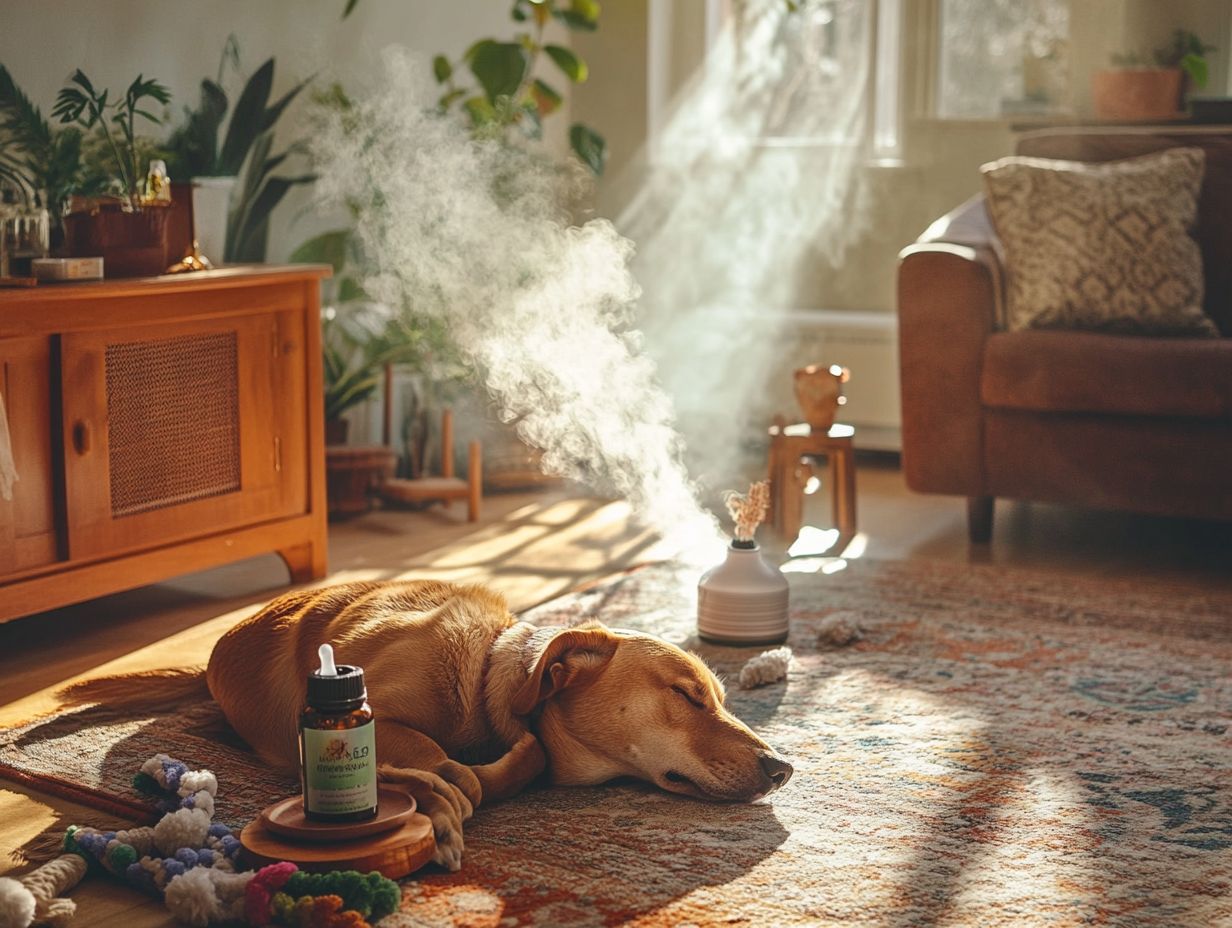
While essential oils can provide a wealth of benefits for eliminating pet odors, prioritizing safety is essential don’t take any chances with your pets! Certain oils may lead to adverse reactions. For additional natural solutions, consider using apple cider vinegar as part of your cleaning regimen.
Grasping the proper usage and dilution of essential oils is paramount to ensure they elevate your space without jeopardizing the well-being of your furry companions.
What Precautions Should Be Taken When Using Essential Oils Around Pets?
When using essential oils around your pets, taking precautions is crucial to prevent potential health risks. It s vital to select pet-safe oils and keep a close eye on your furry friends for any signs of discomfort. Ensure proper ventilation in the area where you re using the oils to create a safe environment. For additional safety tips, always consult resources like Inch By Inch Inspections Inc. for air quality testing and comprehensive advice.
You should thoroughly research which specific oils are safe for your companions. Familiarizing yourself with sensitivity signs like excessive drooling, vomiting, or lethargy will allow you to quickly identify any adverse reactions that may arise.
Considering application methods is equally important; diffusing oils should be done sparingly, and you should never apply them directly to your pet’s skin without prior consultation. Always consult with a veterinarian before introducing any new oils into your home. They can provide tailored recommendations based on your pet s health and breed, ensuring the well-being of your beloved companions.
Other Natural Methods for Pet Odor Removal
Along with essential oils, you have a range of natural methods at your disposal for effectively removing pet odors, offering you a multitude of solutions to explore.
Familiar household ingredients such as baking soda and vinegar are renowned for their impressive odor-neutralizing capabilities. Meanwhile, activated charcoal and hydrogen peroxide present you with further options for tackling those particularly stubborn smells.
1. Baking Soda
Baking soda is your go-to natural solution for tackling pet odors, known for effectively absorbing and neutralizing unwanted smells. Simply sprinkle baking soda on carpets, upholstery, or your pet s bedding to reduce lingering odors and create a fresher environment.
Its alkaline properties break down odor-causing molecules, making it perfect for various surfaces. For optimal results, let the baking soda sit for at least 15 minutes or longer if you can manage it to work its magic.
Try mixing it with essential oils like lavender or tea tree for even better results. This elevates the fragrance and adds antibacterial benefits. Afterward, vacuum thoroughly to ensure that odors and any residue are swept away, leaving you with a cleaner, fresher space.
2. Vinegar
Vinegar is a versatile and effective natural solution for pet odor removal, known for neutralizing unpleasant smells and breaking down stubborn stains. The acetic acid in vinegar (a natural compound found in vinegar) eliminates bacteria and odor-causing compounds, making it a favored choice for pet-related messes.
Incorporating vinegar into your cleaning routine is easy. Mix equal parts of vinegar and water in a spray bottle to create a powerful cleaner for surfaces and fabrics affected by pet mishaps. Always test any vinegar solution on a small, inconspicuous area first to ensure it won t cause damage. Adding essential oils like peppermint or lemon oil enhances its deodorizing and antibacterial properties.
While vinegar is generally safe, exercise caution when your pets are nearby; ventilate the area and keep them away during cleaning. Blend vinegar with essential oils such as lavender or tea tree oil to enhance the scent and add antimicrobial benefits to your cleaning efforts.
3. Activated Charcoal
Activated charcoal is a remarkable natural agent celebrated for its ability to absorb odors. Its unique porous structure traps odor molecules, helping you maintain a fresh and inviting environment at home, even with furry companions around. Activated charcoal also improves air quality, contributing to a more pleasant atmosphere.
Incorporate activated charcoal in litter boxes, on pet bedding, or in the air to dramatically reduce unpleasant scents. Place activated charcoal sachets in strategic spots throughout your home, like near litter boxes or in cozy corners where your pets often sleep.
Add activated charcoal to your pet grooming routine by using shampoos that feature this ingredient to neutralize odors directly on your pet. However, ensure that any activated charcoal product you use is safe for pets, as ingestion can lead to digestive issues. If in doubt, consult with a veterinarian to find appropriate products for your pet’s specific needs.
4. Hydrogen Peroxide
Hydrogen peroxide is a reliable ally in your fight against pet odors and stains. Its powerful cleaning ability makes it a potent disinfectant and bleaching agent, ideal for tackling tough stains on various surfaces. Mixing hydrogen peroxide with baking soda can enhance its effectiveness, providing an extra boost for odor elimination.
As a highly effective natural solution, hydrogen peroxide works wonders by breaking down organic matter and neutralizing unpleasant smells. Its antibacterial properties make it an excellent choice for cleaning up after your furry friends, leaving behind a fresh scent as it operates.
When you’re ready to tackle a mess, apply hydrogen peroxide directly to the affected area using a spray bottle for even coverage. For the best results, gently blot the stain with a cloth after spraying, allowing the solution to penetrate and lift the stain. If you’re facing particularly stubborn stains, consider mixing hydrogen peroxide with a small amount of baking soda or dish soap to create a potent cleaning paste that can work miracles.
Always remember to test any solution on a hidden area first to ensure it won’t discolor the fabric or surface. Stick with lower concentrations for safer use around pets.
Frequently Asked Questions
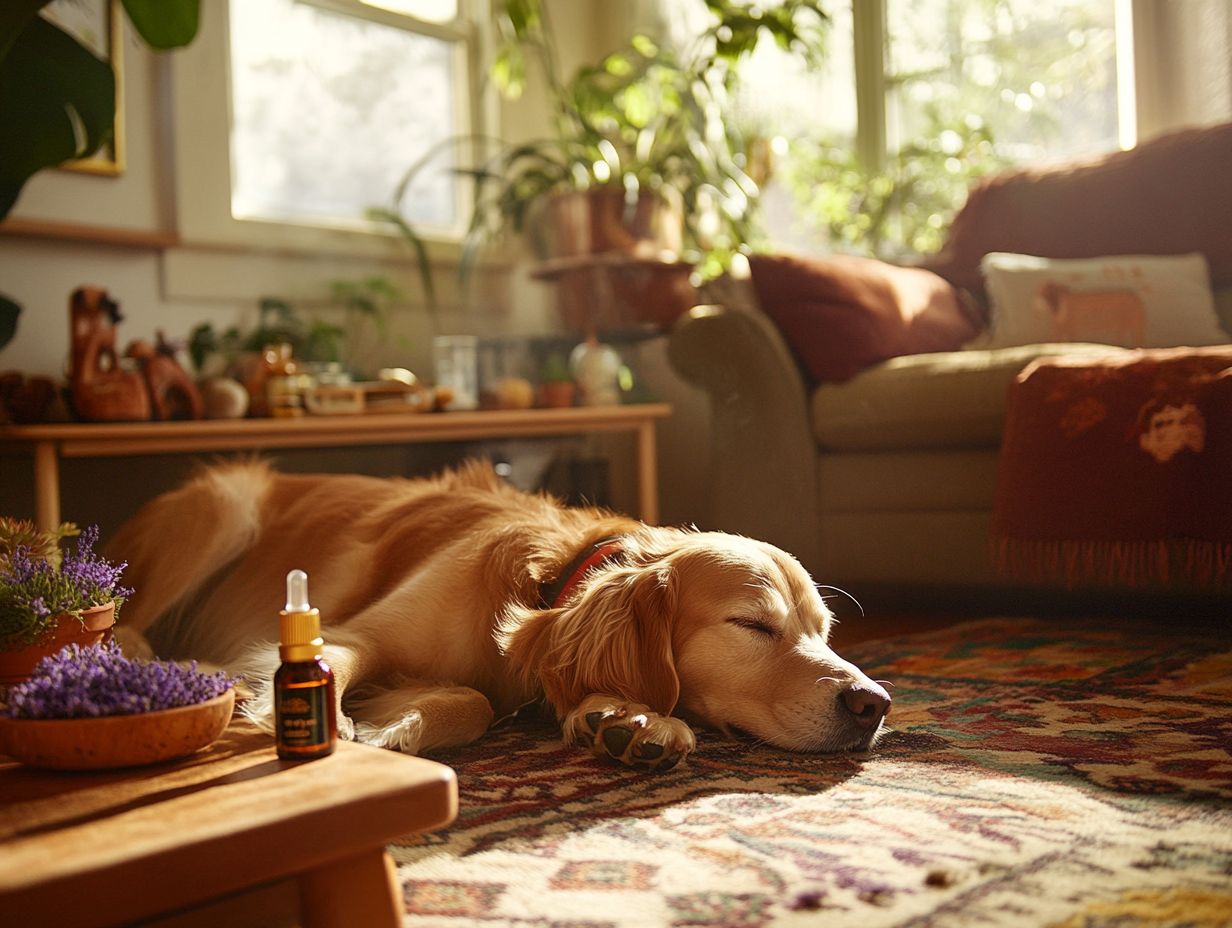
What are essential oils and how can they help with pet odor removal?
Essential oils are concentrated plant extracts with various therapeutic properties. They can neutralize and eliminate unpleasant pet odors, leaving your home smelling fresh and clean.
What are the best essential oils to use for pet odor removal?
Lavender, lemon, peppermint, and eucalyptus essential oils are all effective in eliminating pet odors. They have natural deodorizing properties and can also help to calm and relax your pet.
How do I use essential oils to remove pet odors?
- Mix a few drops of essential oil with water in a spray bottle and mist it over the affected areas.
- Combine a few drops with a carrier oil, such as coconut or almond oil, to safely apply it directly to your pet’s fur.
- Add a few drops to your pet’s bath water or to a diffuser in the room where the odor is coming from.
Are essential oils safe to use around pets?
Yes, as long as they are used properly. Always dilute essential oils before using them on your pet, and avoid applying them on or near their face. It’s also a good idea to introduce your pet to the scent of the oil before using it for odor removal, ensuring they are not sensitive to it.
Can essential oils be harmful to pets?
Some essential oils can be toxic to pets if ingested, so it’s important to keep them safely stored away. Cats are especially sensitive to essential oils, so be cautious when using them around feline friends. If your pet accidentally ingests essential oils, contact your veterinarian immediately.
Can I use essential oils for pet odor removal on all surfaces?
Essential oils can be used on most surfaces, but it’s always a good idea to spot test first to ensure there won’t be any discoloration or damage. Avoid using essential oils on leather or delicate fabrics, as they may be more sensitive to the oils.

